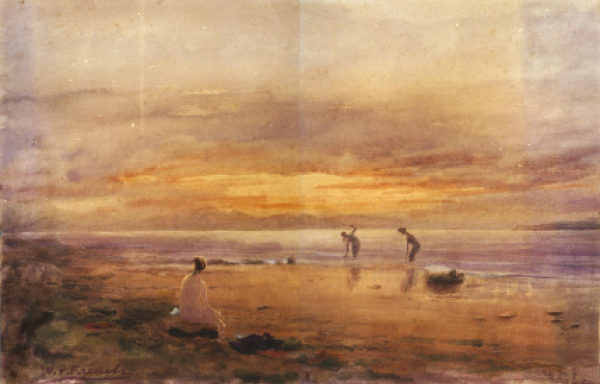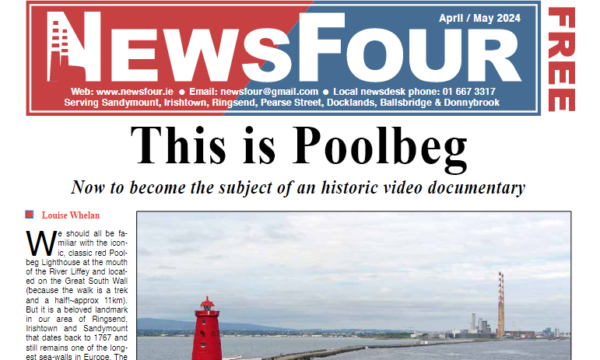By Eoin Meegan
Percy French is known far and wide as the writer of timeless classics such as ‘The Mountains of Mourne’, ‘Phil The Fluter’s Ball’, and ‘Slattery’s Mounted Fut’. Less well-known is that the composer, who was born in 1884 in Roscommon, and not Cavan as is sometimes believed; and he was also a landscape painter of some distinction.
Fewer still will know that, for a short time, he was also a resident of Sandymount. In fact, his time in Sandymount could be said to have been the happiest of his life, until it ended abruptly with the tragic death of his first wife and child.
Coming from a wealthy background, Percy was able to attend Trinity College, and although academically gifted he preferred artistic pursuits. When he first moved there, he bought himself a banjo and starting attending operas at the newly-opened Gaiety Theatre.
He excelled at music, tennis, and painting, and was a somewhat reluctant attendee at lectures. He was a gifted tennis player and had a low cutting net shot that might even give one Roger Federer some trouble, had the pair been able to meet.
Percy French graduated from Trinity with a degree in civil engineering and took up a job inspecting drains in County Cavan with the Board of Works, hence his association with that county. He lived there for many years and fell in love with the beauty of the place, inspiring songs such as the Mountains of Mourne, and Come Back Paddy Reilly to Ballyjamesduff.
He also fell in love with Ettie Armytage Moore, a Cavan native, who was to become his wife. The couple married on the 28th June 1890 at St Stephen’s Church, Dublin. After their honeymoon at Castle Howard, Avoca, they moved to Victoria Lodge, at number 3 St John’s Road, Sandymount.
The couple spent many happy days here, for according to the local rector’s wife, he and his new bride were always known to be laughing and singing. He loved the area, doing many sketches of Sandymount Strand. Sadly the idyllic time was to be all too short, when exactly a year and a day from their wedding, following the birth of their first daughter, both Ettie and the baby died.
Ettie’s loss inspired French to write Gortnamona, a haunting tribute to her. It is believed the double tragedy greatly affected him mentally. He disappeared to the country for several months, ceasing all activity.
French had a keen eye and a sensitive soul. It is said when he came upon a scene of outstanding allure he would stop transfixed, almost intoxicated by its beauty. He produced hundreds of water colours, making a steady income from this as well as from his music.
He toured London during the theatre season, and followed this by a tour of the seaside resorts in Ireland. He also did tours of America and Europe; in 1914 helping to raise money for children displaced due to the war.
His life was a hectic round of shows and engagements, but he always insisted on taking a month off every year when he would repair to the West of Ireland to rest, soak up the scenery, and of course paint.

Above: Mayo Mermaids painted by Percy French.
(Images courtesy of Wiki Commons)
In 1897, he was travelling to do a concert in Moore’s hotel, Kilkee, Co Clare when the train broke down at Miltown Malbay, leaving the passengers stranded for five hours. So put out was he that as well as suing the West Clare Railway Company for loss of earnings, he got the perfect revenge by penning the satirical song ‘Are you right there Michael’.
Later, due to the embarrassment the song caused them, the Company took a libel action against him. It’s reported that French deliberately turned up in the courthouse in Clare nearly an hour late and when questioned by the judge, replied (no doubt to peals of laughter) that it was due to him travelling by the West Clare Railway. The libel was thrown out!
Percy was to marry again, and once more live in Dublin, this time at 35 Mespil Road, not far from his former Sandymount home. His second wife was Helen Sheldon, who was a chorus girl, and the pair had three children, all girls, the first he named after Ettie. Apparently known for his wit, he used to casually inform acquaintances, “We are living by the canal, do drop in.” I’m not sure if the pun was intended. There is also a seat dedicated to him on the Canal very near Paddy Kavanagh’s.
Percy French died in Liverpool after contracted pneumonia in 1920. He was 65. It’s regrettable that his final resting place is not in Ireland, but in Formby, Merseyside where he died. Ettie is buried in St Jerome’s.
Percy French will always be remembered for his witty, occasionally profound, and sometimes subversive songs.



